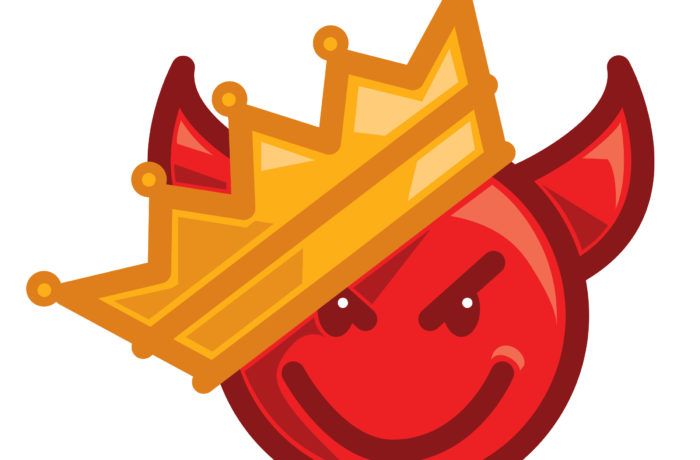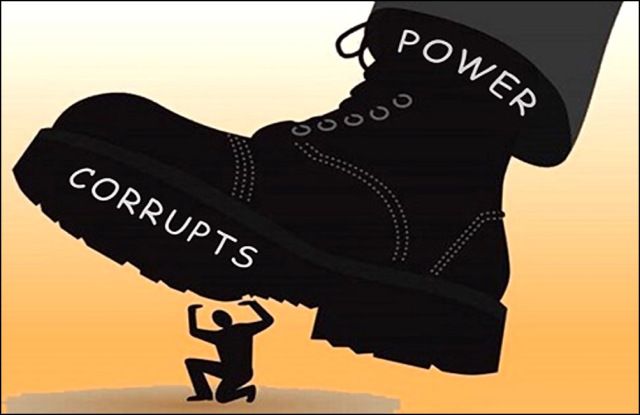Power Corrupts And Absolute Power Corrupts Absolutely
Jul 07, 2019 • 148 views

There is a maxim that power is always dangerous and it attracts the worst and corrupts the best.
It is common knowledge that it is human nature to crave for power. The more power a person acquires, the more power hungry he becomes and with this power the person becomes dodgy and shady. Power is like a bridle which enables the person to exercise dominance, influence, control and to do whatever they want and compels people to do his bidding. The body, mind and soul of an individual are capable of becoming corrupt by this bridle. Power makes one feel imperious as a God which is a sign of corruption.
"Power tends to corrupt and absolute power tends to corrupt absolutely. Great men are almost bad men even when they exercise influence and not authority; still more when you super add the tendency of the certainty of corruption by authority." As quoted by Lord Acton, has been deeply analyzed and dissected numerous times by historians as well as philosophers. The golden words of Acton imply that a person's morality diminishes as his or her power increases. However, some individuals believe that the power does not corrupt a person but it attracts the corruptible. By judging past and current events, the ideology that power corrupts absolutely holds true. One can find several examples of these quandaries simply by reading a history book, poem and many other forms of literature. From Hitler's ideological world and his slaughtering of 6 million Jews to embezzlement by Mohammad Suharto of 15 to 35 million US dollar which led to the complete collapse of Indonesia's economy is the real example of how power corrupts the people.
"There is no more dangerous menace to civilization on that government of incompetent corrupt or a vile man"
- Ludwig Von Mises
Absolute Power not only corrupts or diminishes the morality of a person but also sinks the group, civilization or a nation. Through history we see many rulers and leaders who initially were angels to the society but ended with the wickedness of power. Power is evil unless used appropriately along with checks and balances. When Adolf Hitler began wiping out Jews in what is known to be the most appalling genocide, the world was shocked and the faith in humanity was lost. Perceived as a hero by many, Hitler was indeed a brilliant man but his hunger to become powerful outweighed his abilities and eventually ruined Germany. Mussolini, the Prime minister of Italy was another dictator who followed the footsteps of Hitler for rapid rise to power. The French revolution is another archetypal version of this.
King Louis Bourbon XIV and revolutionary man like Maximilian Robespierre became power addicted after achieving it. They amassed power for fighting against crimes and unjust but ended up using in political persecution and personal crusades.
In ancient Rome, the assassination of Julius Caesar is a double example. Though Caesar was a great king in the history of Rome yet he had been hollowed out because of corruption at the highest level so he moved in the vacuum of the weak central government. He was in turn assassinated by the senators who feared in part that the ideas of republic has been usurped by an absolute tyranny.
"Power corrupts, absolute power is a kind of neat"
- John Lehman
Absolute power corrupts because it gives license to unconsciousness and neglect. It corrupts because it licenses individual to unilaterally, unreflectively and thus arbitrarily impose their will on others. They impose their will without having properly engaged and processed through the reality at hand. Power is meant for the welfare of the society, people and the institutions but when the power corrupts or make one addicted it inflates the ego and through it the ego is erroneously led to believe it has the power to make people, ideas and even reality disappear without due process. In the big picture, nothing is further from the truth as stated before that the power corrupts, give license to unconsciousness. In doing this, not only it destroys the growth opportunity of a victim of such imposition but also no less the growth opportunity of victimizer.
History is the embodiment of such description. During the Renaissance, one of the greatest powers in Europe was the catholic church. The churches had power over almost all Europeans and became corrupt because of it. In ancient times, the church cared for its followers but as time rolled on their status and respected elevated. Subsequently, their power also grew and got absolute control over the European society. The church began to sell indulgences, practice nepotism and became immoral. Before the French revolution most European monarchs worker up to some extent had everything they wanted and did not care for the common people. They sent common people to wars and slogged them on farms for the monarchs profit. All the wealth they gained just made them hungry for more and act even crueler to their subjects.
"No science is immune to the infection of politics & the corruption of power"
- Jacob Brownski
It's great to have power but its obsession is more dangerous than any addiction. It intoxicates one with undue authority, favour and dominance. In simple words, it becomes an opium to those who can't live without power and such type of addiction cracks down an institution and administration. A perfect example of an individual that was corrupted by power was Muammar Gaddafi the President of Libya who shocked the world by his use of power. One can conclude how ambitious Gaddafi was to remain in power. In China, Mao Zedong was the greatest revolutionist in Chinese history, and was an individual replete with leadership. He led the revolution to better the lives of peasants and strengthen China. However, after claiming victory, he also acquired leadership over all of China. Mao also started out with the goal to benefit others but he killed thousands of Chinese, destroyed much of his peoples’ culture, and damaged the economy. His desire for control over people, and acquisition of it hurt China for years to come. Likewise in the Soviet Union, when Stalin rose to power, he killed and deported millions. Before Stalin gained power, he didn’t have the control over people that is necessary to harm them, so Stalin’s power made him even more corrupt.
"Unlimited Power corrupts the professor"
- William Pitt
Literature and media is full of characters who are embodiments of such a description. In the novel Animal Farm of George Orwell, one can begin by arguing that Jones, who had absolute power over the animals, was corrupt and that Napoleon and the other pigs were, when powerless, very idealistic. However, over the course of the novel, we see a change in the pigs as their power increases. Eventually, they begin to do the same things as the humans they once hated. At the end of the novel, they have symbolically become the corrupt overlords as it is "impossible to tell which was which" between the pigs and the men they are playing cards with. The Shakespeare's famous drama the tragedy “Macbeth” there were many examples of corruption. When Macbeth became Thane of Cawdor his wife, Lady Macbeth, was very delighted to hear of such news and when hearing that Duncan, the king, would be coming to dinner at their castle, gave her an idea that maybe they need a new king, Macbeth! This is a perfect example of corruption, as soon as she became more powerful, she was lusting for more. As play carries on the corruption becomes greater with the killing of Banquo. Banquo who was a friend of Macbeth is betrayed when Macbeth, the new king, orders him to be killed only because Banquo has a son named Fleance that Macbeth stupidly believes will take the throne away from him, “To make them kings, the seeds of Banquo kings!” This of course gets the people suspicious, but now it’s too late, Macbeth had gone crazy as well as Lady Macbeth. Of course when you’re in power sometimes you think nothing will happen that will hurt you in any way, that you are safe in the confinement of your office or room. Of course this never works and there’s always some terrible thing bound to happen to you. And that’s exactly what happens to Macbeth.
All of this killing could’ve been avoided if Lady Macbeth was not greedy for more power. When people come into a position of power where the definition of control becomes a new definition according to their point of view, they unleash a feeling in their minds that whatever decision they make that directly conflicts the lives of other people, they don’t feel responsible. That’s when power corrupts the minds of people. People in power feel that they can do anything when they are in power for a long period of time. Macbeth is a classic tale of greed and the corrupting influence of power.
"Power is a sort of tumor that ends by killing the victim's sympathies"
- Henry Adams

